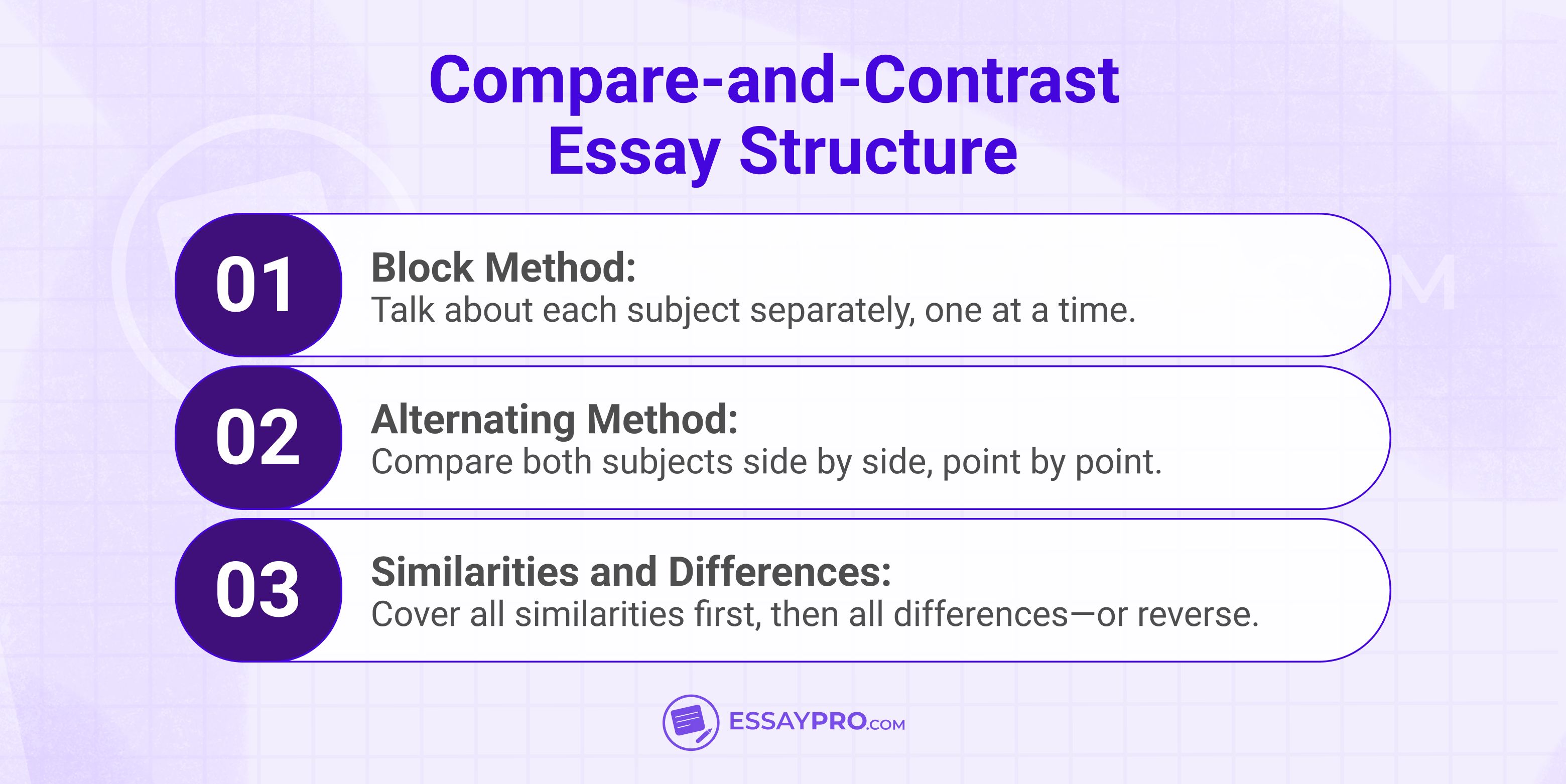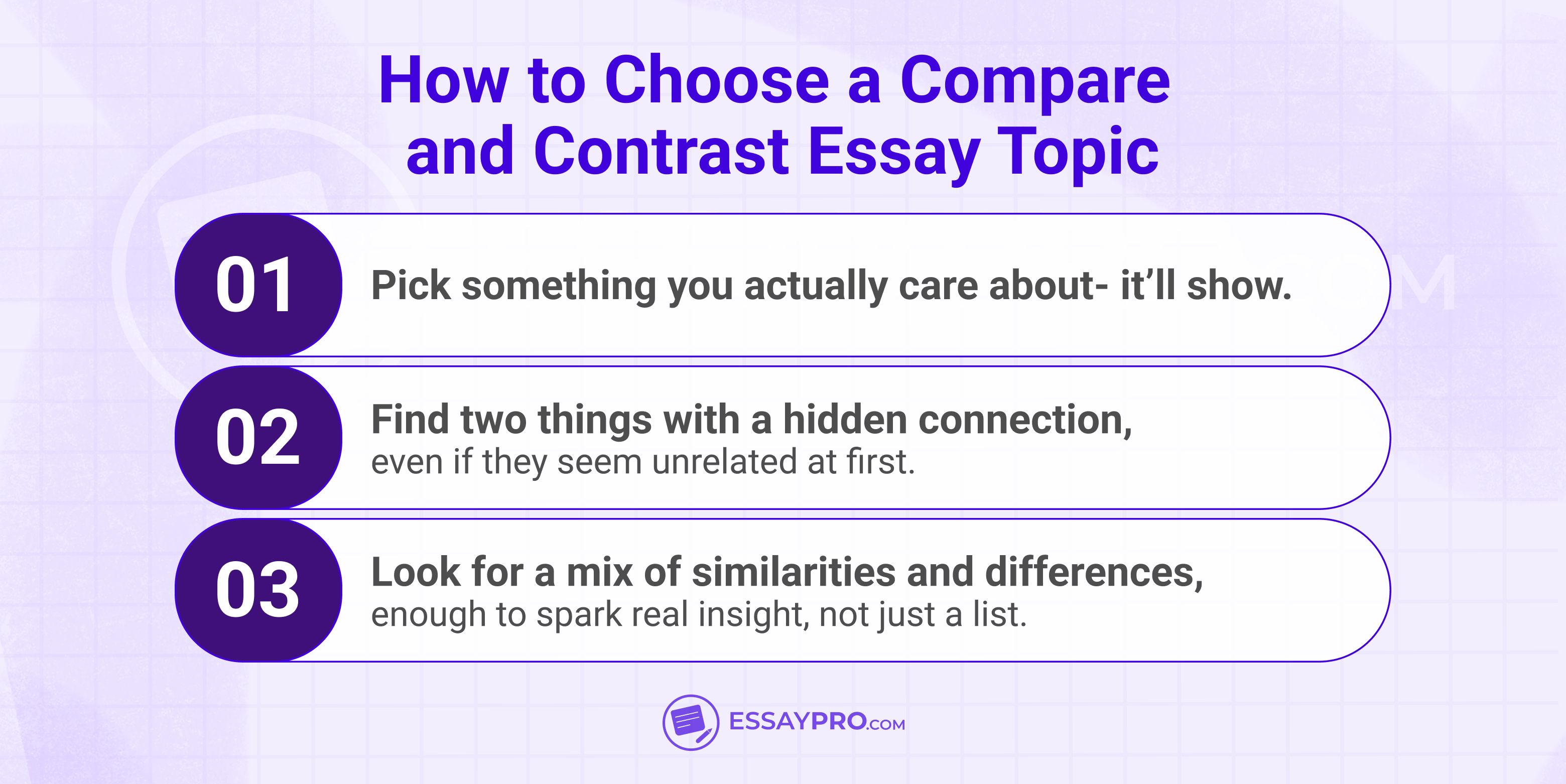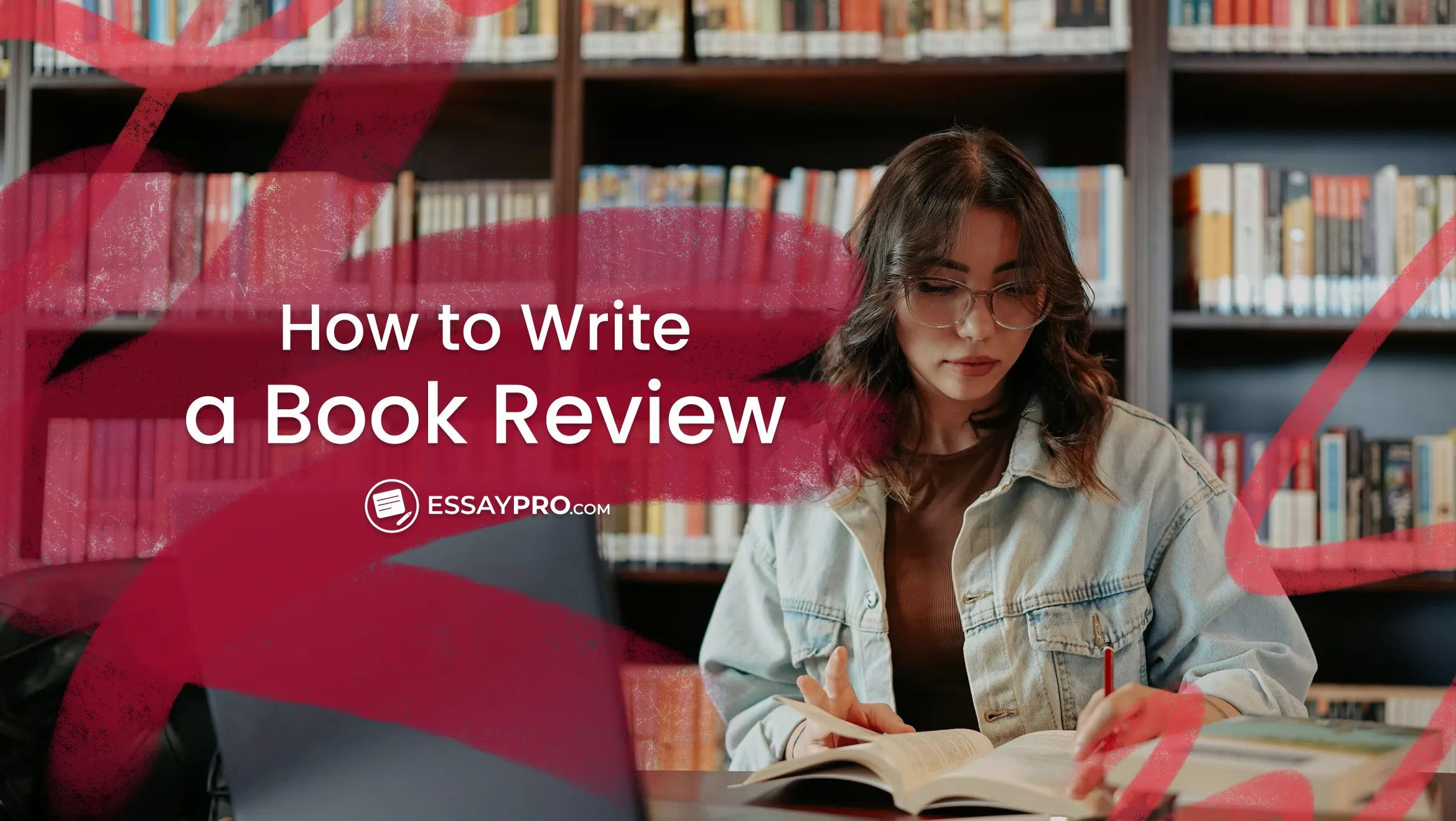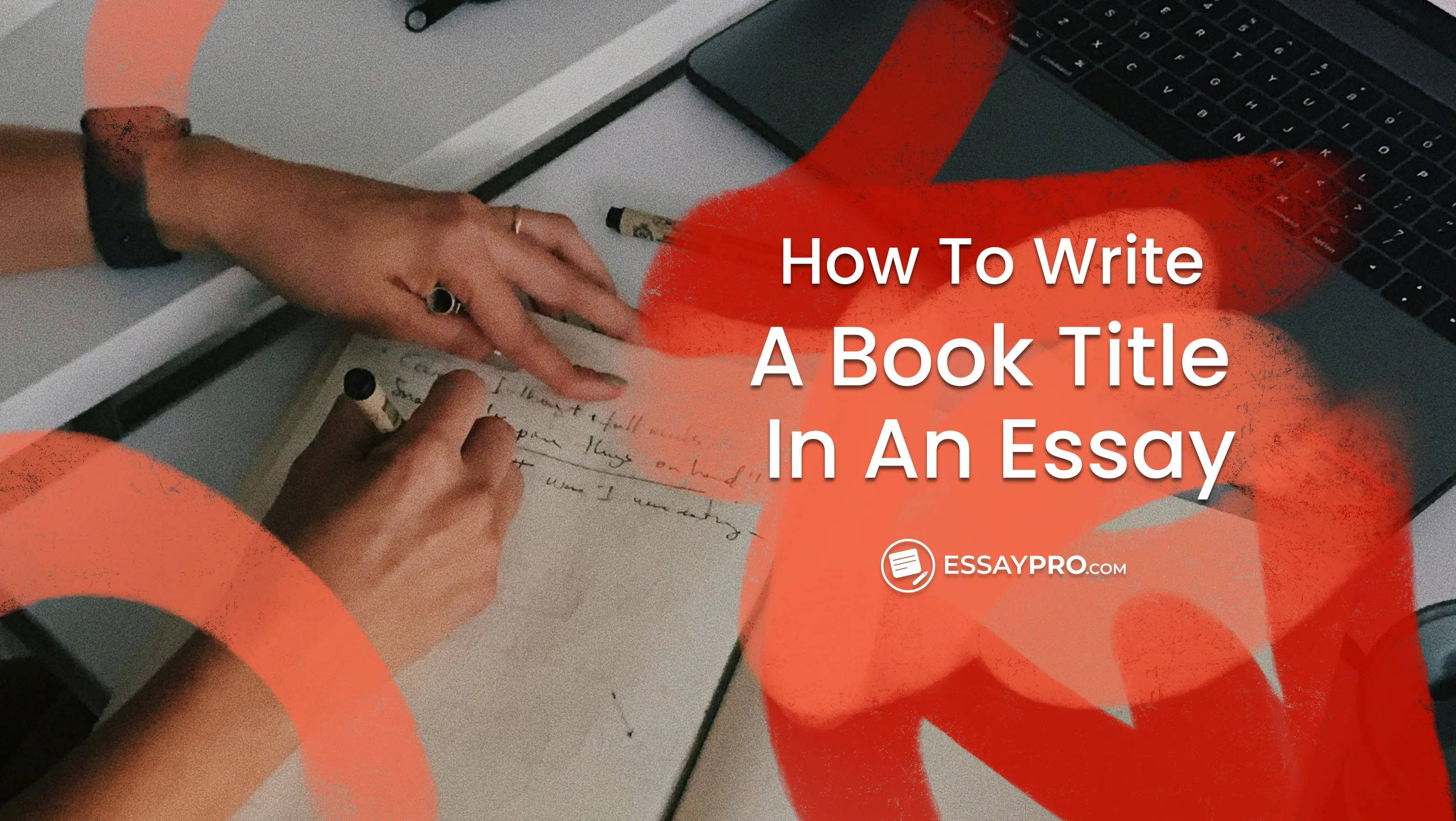Picture two ideas, side by side, one familiar, one unexpected. At first, they seem unrelated. Then you start comparing them, and suddenly, patterns jump out that you didn’t see coming. That’s the kind of thinking a compare and contrast essay demands. It’s not about choosing a winner. It’s about asking better questions. And now more than ever, when opinions constantly clash, exploring both sides with curiosity and depth is a significant skill.
In this article, our college essay writing services providers will share some meaningful topics and give you tips for improve your essay writing skills.
What is a Compare and Contrast Essay?
A compare and contrast essay examines two subjects to highlight both their similarities and their differences. It takes two things, like books, events, viewpoints, even everyday situations, and lines them up side by side. Then it asks the real question: what do these have in common, and where do they pull apart? But it’s not about ticking off a list. It’s about paying attention. You’re looking for patterns, tensions, unexpected overlaps, the kind of details most people rush past. And when you really sit with it, the essay doesn’t just explain the two sides. It shifts how you understand them.
Compare and Contrast Essay Purpose
So what’s the point? Why bother comparing two things at all? It’s not just to say, 'hey, look, these are kind of similar,' or 'they’re totally opposite.' That’s too easy. The real reason is to figure out what happens when you hold them side by side. Sometimes one explains the other. Sometimes it makes things more confusing. That’s fine. The goal isn’t to wrap it all up in a neat bow. It’s to notice what you wouldn’t have seen if you only looked at one of them on its own.
How to Write a Compare and Contrast Essay
The key to a strong compare and contrast essay is showing why those similarities and differences between two ideas matter. Here’s what to do:
- Start with a reason to compare
- Choose your structure:
- Write a real thesis statement
- Organize your body paragraphs
- Use strong evidence
- Make the conclusion count
- Aim for clarity
Thesis
This is where it all starts. Your thesis tells the reader why these two things are worth comparing in the first place. It’s not enough to say, ‘They’re alike in some ways and different in others.’ That’s obvious. Go deeper. What does this comparison help us see? What’s the bigger takeaway? Without a strong thesis, you’re just describing stuff. With it, everything clicks into place.
Organization
The way you set things up matters more than you think.
- Introduction: This is where you name your two topics and give the reader a reason to care. What’s the connection? Why do you think it’s interesting to put these two things next to each other? End the intro with your thesis, a clear sentence that sums up the point of your comparison.
- Body: Most of your writing happens here. You can take one of two routes: talk about all of Topic A, then all of Topic B (that’s the block method), or switch between them as you go, comparing specific things like tone, purpose, or outcome (that’s point-by-point). Either way, stay focused. Each paragraph should do something, it should move the comparison forward.
- Conclusion: Now bring it all together. Don’t just summarize. Say something that leaves the reader thinking. Why does this comparison matter? What do we see now that we didn’t see before?
Below are key phrases used in compare and contrast essays:
If you’re in the middle of writing a dissertation paper, whether it has compare and contrast elements or something else, try our dissertation writing services.
Compare-and-Contrast Essay Structure
There’s no single ‘right’ way to organize a compare and contrast essay and that’s what makes it tricky. Before you start doing a research for your next topic, you need to understand different compare and contrast essay structures. Below are three common ways to lay things out. Each one does something different. Some are more straightforward. Others take a bit more balance.

Here are three structure options:
- Block method
- Alternating method
- Similarities and differences
Block Method (Subject by Subject)
This method is kind of like telling one story at a time. You walk the reader through everything about Subject A first: its key points, traits, themes, whatever you’re focusing on. Then you switch over and do the same for Subject B. Think of it like two full chapters, back to back. It’s a perfect choice when the subjects don’t have a ton of overlap, or when switching back and forth would just get messy. You still need to make the connection between the two clear. Don’t just leave them hanging.
Alternating Method (Point by Point)
This one’s a bit more hands-on. You take a single point, like theme, tone, or impact, and show how both subjects handle it. Then comes the next point, and you do the same here. It’s more back-and-forth, but it helps readers line up the comparisons as they go. This approach works best when the subjects are closely related and the differences show up in the details. You just have to stay on top of it.
Similarities and Differences
This is probably the most straightforward method. You pick a side to start with, either all the similarities or all the differences, lay it out, and then tackle the other. That’s it. It works really well when your essay leans heavily toward one side. If your goal is to show how surprisingly alike two things are, lead with that. If it’s all about contrast, start there. It’s simple and super readable when done right.
Compare and Contrast Essay Examples
Below are a few sample essays from our service that show how different approaches, tones, and structures can work depending on what you're comparing and why.
How to Choose Compare and Contrast Essay Topics
A good essay starts with a good question, and that begins with picking the right topic. If you’re stuck, here are three tips to help you find a topic that’s actually worth writing about:

- Start with what you care about. If the subject bores you, writing about it will be torture. Go with something that feels familiar or personal, books you’ve read, places you’ve lived, things you’ve experienced. You’ll have more to say, and it’ll show.
- Pick two things that share a thread. The best comparisons come from things that seem different but actually share something underneath. Think: superhero movies and Greek myths. They look totally separate, but once you dig in, the overlap gets interesting.
- Make sure there’s tension. If two things are too similar, there’s not much to explore. And if they’re completely unrelated, the essay falls apart. The sweet spot is where you have clear similarities and differences, enough to build a real argument, not just a list.
If you’re still feeling confused about the complexities of the compare and contrast essay, contact our paper writing service.


Compare and Contrast Essay Topics for Students
Sometimes, the most interesting comparisons come from everyday life, culture, habits, or ideas you didn’t think much about until you started writing. Below are comparison and contrast topic ideas for different student levels. They're about the world, choices, and how things shape the way we live or think.
For College Students
- Living alone for the first time vs. sharing a space with three very different personalities
- Relying on caffeine every day vs. trying to fix your sleep schedule for real this time
- Finding your people through shared hobbies vs. random dorm assignments and lucky friendships
- Trying to cook actual meals vs. mastering the art of microwave survival
- Spending weekends exploring new cities vs. catching up on sleep and laundry
- Getting your news from TikTok vs. sticking to long-form podcasts and articles
- Building a career around your major vs. realizing your side hobby might be the real path
- Choosing to stay home for the holidays vs. traveling to avoid awkward family conversations
- Managing your own money vs. constantly borrowing until the next student loan drops
- Doing a digital detox for a week vs. living online without feeling burnt out
- Trying to date in a hookup culture vs. looking for something serious in a casual world
- Dealing with social anxiety in new cities vs. feeling isolated in your hometown
- Volunteering for causes you care about vs. donating money when you’re short on time
- Saying yes to everything for the experience vs. learning when to say no without guilt
- Planning a solo trip abroad vs. going with friends and compromising every decision
For University Students
- Starting a passion project while juggling classes vs. waiting for the ‘perfect time’ to begin
- Trying to stay updated with global politics vs. choosing peace by unplugging from the chaos
- Sticking to familiar habits from high school vs. reinventing yourself entirely at university
- Building a personal brand online vs. staying offline to avoid being constantly watched
- Choosing creative work with lower pay vs. stable jobs that don’t excite you
- Balancing mental health with productivity vs. pushing through exhaustion for success
- Living in the moment vs. obsessing over five-year plans
- Being close to family emotionally vs. needing physical distance to grow
- Focusing on self-growth now vs. putting it off until your career settles
- Letting go of childhood friendships vs. holding onto them through changing seasons
- Changing majors midway through vs. sticking it out just to finish
- Feeling pressure to document everything vs. living experiences without sharing them
- Committing to one dream job vs. exploring multiple paths before choosing
- Long-distance relationships that evolve with time vs. ones that quietly fall apart
- Finding fulfillment through community work vs. building success for yourself first
For High School Students
- Playing video games to relax vs. reading to escape reality
- Spending weekends with friends vs. needing time alone to recharge
- Listening to music that reflects your mood vs. songs that help change it
- Exploring new fashion trends online vs. sticking to what feels comfortable
- Using social media to connect vs. feeling overwhelmed by online pressure
- Talking to parents about emotions vs. keeping everything to yourself
- Choosing to be kind in tough situations vs. standing up for yourself with confidence
- Being the class clown to cope vs. staying quiet to avoid attention
- Getting into hobbies for fun vs. turning them into achievements for college apps
- Having a crush on someone you never talk to vs. risking embarrassment to make a move
- Telling friends the truth vs. keeping the peace, even if it’s fake
- Fitting in with a group vs. being completely yourself, even if it’s lonely sometimes
- Trusting your instincts vs. second-guessing every small decision
- Caring what people think vs. learning to stop giving it power
- Trying to grow up fast vs. holding onto the last bits of childhood
Good Compare and Contrast Essay Topics on Different Subjects
Looking for something deeper than the usual topics? These ideas are grouped by subject and meant to get you thinking past the obvious.
Politics
- How democracy actually works in small countries compared to powerful ones
- Is it possible to be proud of your country and still think globally?
- What really separates modern liberals and conservatives today?
- Who has more control: presidents or prime ministers?
- Are today’s authoritarian leaders really that different from those in the past?
- Can real change come from the top, or does it always start with the people?
- Do two-party systems keep things stable, or just limit choices?
- Are online protests as powerful as showing up in the streets?
- How do countries decide when free speech crosses a line?
- Why do older voters show up more than younger ones, and does it matter?
- What does propaganda look like when there’s no war going on?
- When do political debates actually teach us something, and when are they just for show?
- How much do local decisions affect your day compared to national laws?
- Are open borders idealistic, or just more realistic than people think?
- Why do wealthy and developing countries treat climate change so differently?ntries
Literature and Art
- How modern poetry feels vs. the classics
- Reading a book vs. seeing the movie: what do you lose or gain?
- Shakespeare’s heroes vs. Marvel’s: what makes a hero, really?
- Oil paintings vs. digital art: Does medium change meaning?
- Stories told in pictures vs. stories told in words
- Why some art ends up in museums and some on city walls
- Realism in novels vs. surrealism in paintings
- How horror works on the page vs. on the screen
- The power of silence in poetry vs. minimalist painting
- Ancient myths vs. modern retellings
- Why abstract art confuses some and moves others
- Tragedy in classic theater vs. contemporary film
- How war is depicted in literature vs. visual art
- Writing as rebellion vs. art as resistance
- The feeling of holding a book vs. viewing a digital gallery
Economics
- Living in a capitalist world vs. imagining a socialist one
- Spending habits in poor vs. wealthy countries
- Cryptocurrency vs. traditional banking: what’s trust based on?
- Big-box retail vs. supporting local shops
- What the gig economy offers vs. what it takes away
- Universal basic income vs. minimum wage: what helps more long term?
- Consumer culture in the 2000s vs. today
- Why people invest in stocks vs. real estate
- Job security in stable vs. unstable economies
- The rise of influencer marketing vs. traditional advertising
- Is financial freedom really possible in your 20s vs. your 50s?
- Buying now vs. saving for later: how values shift across cultures
- Shopping online vs. in-store: what’s actually more efficient?
- Fast fashion vs. slow fashion: cost vs. conscience
- How inflation hits everyday people vs. corporations
Philosophy
- Living with a strict moral code vs. making it up as you go
- What free will feels like vs. what science says about it
- Doing what’s right vs. doing what works
- Happiness as a goal vs. meaning as a goal
- Living for yourself vs. living for others
- Why some people believe in destiny and others don’t
- The pursuit of truth vs. the comfort of belief
- Socrates vs. modern self-help: Who gives better advice?
- Eastern ideas of balance vs. Western ideas of progress
- Moral gray areas in old philosophy vs. modern ethics
- Believing in something vs. questioning everything
- Why justice looks different across cultures
- The soul as metaphor vs. the soul as reality
- Thinking about death in ancient times vs. today
- Big questions that matter vs. small questions that change your life
Psychology
- How childhood shapes you vs. how you shape yourself later
- Coping with stress: distraction vs. processing
- What it means to be ‘introverted’ vs. just needing space
- Anxiety that keeps you alert vs. anxiety that shuts you down
- When motivation comes from within vs. outside pressure
- Group therapy vs. one-on-one: what works for whom?
- How dreams are interpreted by science vs. psychoanalysis
- Social media’s impact on self-image vs. real-life interaction
- Habitual behavior vs. conscious choices
- Love that feels safe vs. love that feels exciting
- Emotions we name vs. the ones we don’t
- Why some people avoid conflict, and others seek it
- How people process grief across cultures
- Knowing vs. feeling something is true
- Memory as a personal story vs. memory as hard data
Science and Technologies
- Reading a physical book vs. using an e-reader
- Smart homes: helpful or creepy?
- Why people trust doctors vs. why people trust Google
- Genetically modified food vs. organic farming
- Space exploration vs. exploring the deep ocean
- Electric cars vs. gas-powered ones: beyond the hype
- Tech that connects us vs. tech that isolates us
- Natural disasters: predicting them vs. preparing for them
- AI-generated content vs. human-created art
- Wearing a smartwatch vs. not tracking anything at all
- Old-school inventions that changed the world vs. modern ones
- The thrill of innovation vs. the fear of where it’s headed
- Science in labs vs. science in nature
- The line between helping and replacing human ability
- When technology solves a problem vs. when it creates one
Easy Compare and Contrast Essay Topics on Social Issues
Social issues are everywhere, from your feed to the news to your friend’s group chat. These topics can be messy, so start simple, and along the way, you might find something you hadn’t thought of before.
- Social media pressure vs. real-life peer pressure
- Calling someone out online vs. having a tough conversation in person
- Living in poverty in a small town vs. a big city
- Trying to afford healthcare with insurance vs. without it
- How people used to see gender roles vs. how we see them now
- Gender pay gap vs. racial pay gap: What’s driving each one?
- Borrowing from another culture vs. respecting it
- Volunteering time vs. donating money
- How private life felt before the internet vs. now
- Speaking your mind vs. crossing the line
- Sharing stories online vs. actually changing policy
- Minimum wage struggles vs. student debt stress
- Cancel culture vs. accountability: Where’s the line?
- Being 'woke' vs. being well-informed
- Body positivity vs. just not thinking about your body all the time
Compare and Contrast Essay Topics on Sport
Sports are not merely about winning or losing. They often show who we are when we compete, lose, or keep going. Whether you play, watch, or avoid it, these topics are worth exploring.
- Playing on a team vs. going solo
- Winning the game vs. just having fun
- Being a college athlete vs. playing pick-up games
- Old-school training drills vs. modern fitness tech
- Watching sports live vs. watching from your couch
- The Olympics vs. the World Cup: What brings people together more?
- Martial arts for discipline vs. combat sports for competition
- Loyalty to a team vs. love for a star player
- Natural talent vs. nonstop hard work
- Getting injured as a kid vs. as an adult
- How women’s sports are covered vs. how men’s are
- Toughing it out vs. knowing when to stop
- Playing to compete vs. playing to connect
- Basketball in a gym vs. soccer on a field
- What matters more: Physical strength or mental focus?
Compare and Contrast Essay Topics on Education
There’s a lot to discuss about education. Everyone has been through school, but the experience is unique. Some people thrive in structure, others do better with freedom. These topics from our essay writer explore what learning looks like in different forms and how it changes depending on where you are, what you need, and who's in charge of the lesson.
- Online classes from bed vs. sitting in a classroom
- Memorizing facts for tests vs. actually learning how to do things
- How school works in the U.S. vs. other countries
- Going to public school vs. private school
- Choosing STEM vs. chasing the arts
- Taking standardized tests vs. doing big projects
- Endless worksheets vs. real-world lessons
- Single-gender classrooms vs. learning with everyone
- Teachers leading class vs. students driving the conversation
- Learning with good resources vs. making do with less
- Learning a language in class vs. living it in real life
- Trying to cheat online vs. sneaking answers in class
- Having a degree vs. having experience
- Being stuck in a lecture vs. learning through a screen
- Schools with strict rules vs. schools that let you breathe
Compare and Contrast Essay Topics on Tourism
Travel can feel exciting, exhausting, freeing, or overwhelming, sometimes all at once. These topics discuss how different styles of tourism shape the way we see the world.
- Taking the eco-friendly route vs. going all out with luxury
- Exploring solo vs. traveling with a group
- Snapping photos at landmarks vs. getting lost in side streets
- Big city vibes vs. the quiet charm of small towns
- Trips for culture vs. trips for thrills
- Backpacking with a budget vs. living it up in a resort
- Going local vs. sticking to touristy spots
- Traveling off-season vs. joining the crowds during peak
- A quick weekend getaway vs. a long trip abroad
- Tourism’s effect on nature vs. on local people
- Taking a cruise vs. hitting the road
- Flying across the world vs. exploring your own country
- Digital nomads who stay a while vs. tourists who breeze through
- Booking a travel package vs. planning it all yourself
- Virtual travel through a screen vs. actually being there
Health and Nutrition Compare and Contrast Essay Topics
Every one of us has our own idea of being healthy. These topics look at how different choices affect our bodies, routines, and sometimes our mindset.
- Trying out plant-based eating vs. sticking with a mix that includes meat
- Cooking your own meals every day vs. grabbing takeout because life’s busy
- Heading to the doctor when something’s off vs. trying home remedies first
- Getting your workout done at sunrise vs. squeezing it in late at night
- Paying extra for organic produce vs. just buying what fits your budget
- Focusing on high-protein meals vs. cutting carbs to stay on track
- Popping daily vitamins vs. getting everything from the food on your plate
- Running to build stamina vs. lifting to feel stronger
- Choosing vegan meals for health reasons vs. doing it for animal rights
- Going to therapy now vs. how mental health was treated in the past
- Trying to eat mostly fresh food vs. relying on snacks and packaged stuff
- Using public healthcare services vs. paying out of pocket for private care
- Cutting sugar with artificial sweeteners vs. using honey or fruit instead
- Trying a crash diet to lose weight fast vs. changing habits slowly for the long run
- Just drinking water when you're tired vs. reaching for something like Gatorade
Controversial Compare and Contrast Essay Topics
Compare and contrast essays thrive with controversial topics when there’s no clear right or wrong. These topics can be messy at first, but that’s exactly why they’re interesting to explore.
- Letting people say what they want online vs. limiting speech that causes harm
- Tightening gun laws for safety vs. protecting the right to own one
- Keeping abortion legal vs. placing limits based on values or beliefs
- Using the death penalty for justice vs. giving life sentences with no parole
- Making vaccines mandatory vs. letting people choose for themselves
- Testing medicine on animals vs. testing beauty products
- Paying everyone a basic income vs. sticking with existing welfare programs
- Legalizing marijuana for fun vs. keeping it for medical use only
- Raising the minimum wage to a livable level vs. leaving it as-is
- Growing up in a 'traditional' family setup vs. something more modern
- Helping college applicants with affirmative action vs. only looking at grades
- Fighting climate change actively vs. saying it’s not as urgent as people think
- Letting social media stay open vs. adding more rules to protect users
- Losing jobs to AI tech vs. finding new kinds of work because of it
- Respecting religious freedom vs. stopping harmful beliefs from spreading
Compare and Contrast Essay Topics on Environmental Issues
Everyone talks about saving the planet, but the ways we go about it can look completely different. These topics let you weigh different approaches to climate and conservation, and ask which ones make a difference.
- Switching to solar or wind power vs. sticking with oil and gas
- Cleaning up plastic from the ocean vs. reducing landfill waste
- Driving an electric car vs. taking the bus everywhere
- Saving endangered animals vs. building more housing
- Using sunlight to power your home vs. using wind turbines
- Eating less meat to help the planet vs. being more mindful about where it comes from
- Making eco-friendly choices at home vs. changing laws and policies
- Buying fast fashion vs. investing in clothes that last
- Recycling in big cities vs. trying to recycle in small towns
- Paying to offset your carbon footprint vs. just using less energy
- What rich countries are doing about climate vs. what poorer ones can afford to do
- Cleaning up after disasters vs. planning ahead so they’re less damaging
- Running a green business vs. sticking with traditional methods
- Using less paper in daily life vs. relying on digital everything
- Changing your personal habits vs. pushing for massive government reform
Career Compare and Contrast Essay Topics
There’s no 'perfect' career path and what works for one person might sound awful to someone else. These topics examine what people want from their work.
- Having a job you can do from anywhere vs. going into an office every day
- Freelancing on your own terms vs. having a stable full-time position
- Choosing a creative path like writing or art vs. climbing the corporate ladder
- Taking a high-paying job that drains you vs. doing work you love for less
- Starting your own business from scratch vs. joining a company that already works
- Going into STEM fields vs. studying the humanities
- Working completely solo vs. being part of a close-knit team
- Joining a brand-new startup vs. working at a huge, established company
- Having a career that involves travel vs. one that keeps you home
- Being a team leader vs. being an expert in one area
- Having flexible hours you control vs. sticking to a set 9-to-5
- Picking a job with long-term security vs. choosing one with short-term freedom
- Working for the government vs. working in the private sector
- Spending years in school for your dream job vs. learning on the job right away
- Juggling side gigs to stay flexible vs. putting everything into one steady role
Final Thoughts
Whether you’re comparing two ideas, stories, or systems, a strong compare and contrast essay helps you make real connections. And if you ever get stuck outlining, organizing, or just getting started, don’t stress. You can always get research paper help from EssayPro’s experienced professionals.
FAQs
How Do You Write a Compare and Contrast Essay?
Start with two things that actually make sense to compare. Don’t just pick random opposites. Look for a connection. Then figure out what you want to say about them. And don’t just describe; explain what your comparisons show.
What Is an Example of a Compare and Contrast Essay Topic?
A good topic is something people actually care about. Think ‘Working from home vs. going into an office’ or ‘Plant-based eating vs. a mixed diet that includes meat.’

Daniel Parker
is a seasoned educational writer focusing on scholarship guidance, research papers, and various forms of academic essays including reflective and narrative essays. His expertise also extends to detailed case studies. A scholar with a background in English Literature and Education, Daniel’s work on EssayPro blog aims to support students in achieving academic excellence and securing scholarships. His hobbies include reading classic literature and participating in academic forums.
- The Writing Center, University of North Carolina at Chapel Hill. (n.d.). Comparing and contrasting. UNC Writing Center. https://writingcenter.unc.edu/tips-and-tools/comparing-and-contrasting/
- Walden University Writing Center. (n.d.). Compare/contrast essays. Walden University. https://academicguides.waldenu.edu/writingcenter/writingprocess/comparecontrast







